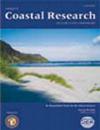Review and Analysis of Electronic Monitoring (EM) Minimum Standards for Pelagic Main Fishing Gear
4区 地球科学
Q3 Earth and Planetary Sciences
引用次数: 0
Abstract
ABSTRACT Sun, Y.; Zhang, S.; Yang, S.; Zhou, W.; Cui, X., and Wu, Y., 2024. Review and analysis of electronic monitoring (EM) minimum standards for pelagic main fishing gear. Journal of Coastal Research, 40(4), 816–825. Charlotte (North Carolina), ISSN 0749-0208. Observer systems for monitoring and collecting catch information from pelagic fisheries are essential in ensuring the sustainable harvesting of pelagic fisheries resources. The emergence in recent years of electronic observers that rely on video surveillance is gradually becoming a complementary or alternative measure to human observers. Electronic observers' security and ease of use make full electronic monitoring (EM) of ocean-going fishing ships possible while ensuring complete data availability. The development and improvement of its standards are the keys to ensuring the large-scale application of EM. This paper summarizes and justifies the minimum standards for EM for pelagic fishing by analyzing the standards and current status of human observers, documenting the functions and applications of EM systems, comparing the monitoring capabilities of human observers and EM, and analyzing the characteristics of the three main fishing methods: purse seine, trawl, and longline, respectively, in terms of equipment platform technology, data collection, and data management. The development of EM standards can clarify the cost of the entire monitoring process, ensure the compliance and economics of EM, and achieve effective long-term monitoring of pelagic fishing.远洋主渔具电子监测(EM)最低标准的审查和分析
ABSTRACT Sun, Y.; Zhang, S.; Yang, S.; Zhou, W.; Cui, X., and Wu, Y., 2024.中上层主力渔具电子监测(EM)最低标准的回顾与分析。沿海研究期刊》,40(4),816-825。夏洛特(北卡罗来纳州),ISSN 0749-0208。监测和收集中上层渔业渔获量信息的观测系统对确保中上层渔业资源的可持续 捕捞至关重要。近年来出现的依靠视频监控的电子观察员逐渐成为人工观察员的补充或替代措施。电子观察员的安全性和易用性使对远洋渔船的全面电子监测(EM)成为可能,同时确保了数据的完整可用性。制定和完善其标准是确保 EM 大规模应用的关键。本文通过分析人工观察员的标准和现状,记录EM系统的功能和应用,比较人工观察员和EM的监测能力,分析围网、拖网和延绳三种主要捕鱼方式在设备平台技术、数据采集和数据管理方面的特点,总结和论证了远洋渔业EM的最低标准。制定电磁监测标准可以明确整个监测过程的成本,确保电磁监测的合规性和经济性,实现对远洋捕捞的长期有效监测。
本文章由计算机程序翻译,如有差异,请以英文原文为准。
求助全文
约1分钟内获得全文
求助全文
来源期刊

Journal of Coastal Research
地学-地球科学综合
自引率
0.00%
发文量
87
审稿时长
3-8 weeks
期刊介绍:
The Journal of Coastal Research (JCR) is one of the leading international journals for coastal studies and processes, and is published bi-monthly by the Coastal Education & Research Foundation [CERF]. By covering the entire field of coastal research, the JCR encompasses all subjects relevant to natural and engineered environments (freshwater, brackish, or marine) and the protection/management of their resources in the vicinity of coastlines of the world. Even though the journal broadly focuses on immediate shoreline zones, the JCR also embraces those coastal environments that either reach some indefinite distance inland or that extend seaward beyond the outer margins of the sublittoral (neritic) zone. The JCR disseminates accurate information to both the public and research specialists around the world on all aspects of coastal issues in an effort to maintain or improve the quality of our planet''s shoreline resources.
 求助内容:
求助内容: 应助结果提醒方式:
应助结果提醒方式:


